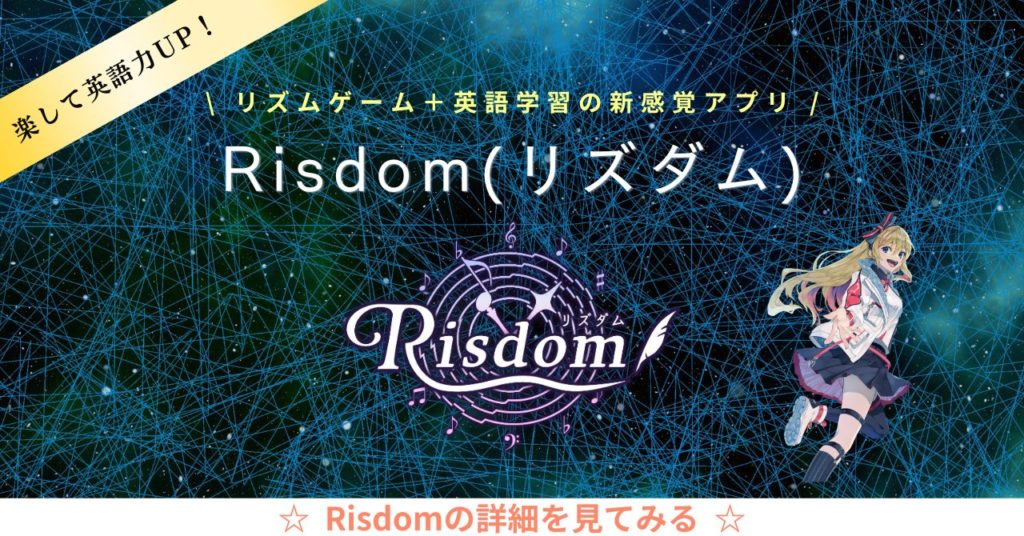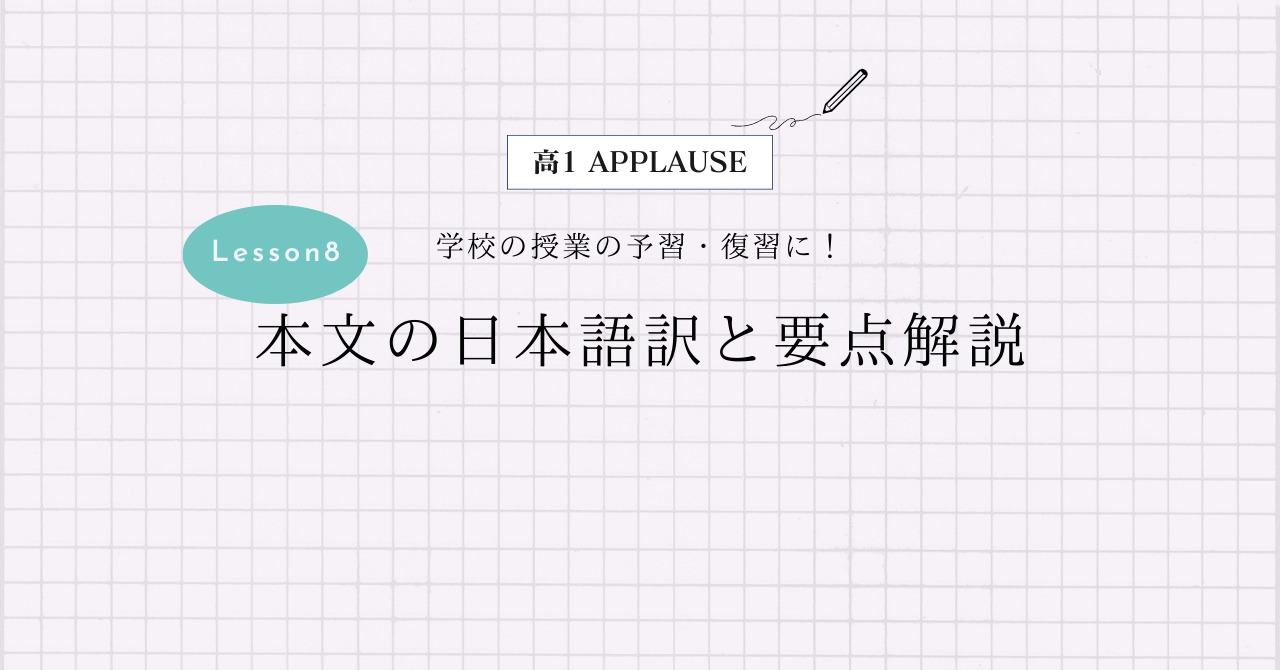開隆堂 高1APPLAUSE Lesson10 Section3の本文の日本語訳と重要箇所の解説です。
Lesson10-1, 10-2, 10-4の解説はこちらからご覧ください。
>高1APPLAUSE Lesson10 Section1 本文和訳
>高1APPLAUSE Lesson10 Section2 本文和訳
>高1APPLAUSE Lesson10 Section4 本文和訳
- APPLAUSE Lesson10 Section3 本文と日本語訳
- APPLAUSE Lesson10 Section3 重要事項の解説
- Visiting Bangladesh, Oda was shocked to see the local people drink water from the unimaginably dirty rivers or use it for cooking.
- Since he knew many infants could die of diarrhea caused by this dirty water, he thought,
- “I would like to offer them good and delicious water.
- But if I keep on giving it to them for free, my company will go bankrupt.
- And, more than anything, the local people won’t be able to be independent.”
- Then, he sold the purifying powder, which he developed by himself, for a low price, in order to offer precious drinking water to the people in developing countries all over the world.
- Letting them sell the powder, he also creates employment to eliminate poverty.
- APPLAUSE Lesson10 Section3 まとめ
APPLAUSE Lesson10 Section3 本文と日本語訳
Visiting Bangladesh, Oda was shocked to see the local people drink water from the unimaginably dirty rivers or use it for cooking.
「バングラデシュを訪れたとき、小田さんは地元の人々が想像を絶するほど汚い川の水を飲んだり、その水を料理に使うのを見て衝撃を受けました。」
Since he knew many infants could die of diarrhea caused by this dirty water, he thought,
「多くの幼児はこの汚い水によって引き起こされる下痢が原因で死ぬことがある、ということを彼は知っていたので、彼はこう思いました。」
“I would like to offer them good and delicious water.
『子どもたちにきれいで美味しい水を提供したい。』
But if I keep on giving it to them for free, my company will go bankrupt.
『でももし私が彼らに無料で水を与え続けるなら、私の会社は倒産してしまうだろう。』
And, more than anything, the local people won’t be able to be independent.”
『そして何よりも、地元の人々は自立することができないだろう。』
Then, he sold the purifying powder, which he developed by himself, for a low price, in order to offer precious drinking water to the people in developing countries all over the world.
「それから、世界中の発展途上国の人々に貴重な飲み水を提供するために、彼が自分で開発した浄化する粉を低価格で売りました。」
Letting them sell the powder, he also creates employment to eliminate poverty.
「また、彼らにその粉を売ってもらっているので、貧困をなくすための雇用も創出しています。」

APPLAUSE Lesson10 Section3 重要事項の解説
Visiting Bangladesh, Oda was shocked to see the local people drink water from the unimaginably dirty rivers or use it for cooking.
この文では「分詞構文」が使われていますね。
もともとは、”When Oda visited Bangladesh, he was shocked to~”という文で、接続詞”When”と主語が省略されて、”visit”は”Visiting”に変わっています。
“be shocked”で「衝撃(ショック)を受ける」という意味で、後ろには“to see”と「不定詞の副詞的用法」をつなげることで、衝撃を受けた理由を表しています。
“see”は「知覚動詞」で、“see 名詞 動詞の原形”という形で「名詞が~するのを見る」という意味になります。
この文では“drink”と“use”がその動作にあたりますね。
“local”は「地元の」、“dirty”は「汚い」という形容詞、“unimaginably”は「想像に絶する」という副詞、“cooking”は「料理」という名詞です。
“it”は“water from the unimaginably dirty rivers”を指していますね。
Since he knew many infants could die of diarrhea caused by this dirty water, he thought,
“since”は「~だから」という理由を表す接続詞です。“because”, “as”と同じ意味になります。
“knew”の後ろには「接続詞that」が省略されていますね。
“infant”は「幼児」、“diarrhea”は「下痢」という名詞で、“could”は「~の可能性がある、~だろう」といった推量の助動詞になります。
“die”は「死ぬ」という動詞で、“die of~”で「~が原因で死ぬ」という表現です。
“cause”は「を引き起こす」という動詞ですが、ここでは「過去分詞」として、“caused by this dirty water”が“diarrhea”を修飾しています。
“I would like to offer them good and delicious water.
“would like”は“want”と同じ「が欲しい」という意味で,“would like to 動詞の原形”で「~したい」という重要表現になります。
“offer”は「を提供する、に申し出る」という動詞で、“offer 人 もの”で「人にものを提供する」という重要表現です。
“offer もの to 人”の形に書き換えることもできますよ!
“them”は“many infants”を指していて、“delicious”は「美味しい」という形容詞になります。
But if I keep on giving it to them for free, my company will go bankrupt.
この文では「接続詞if」が使われています。
“keep on -ing”は「~し続ける」という表現で、“keep -ing”でもOKです。
“give 人 もの”で「人にものを与える」となって,“give もの to 人”でも同じ意味になります。
ただし、「もの」が代名詞のときは、必ず”give もの to 人”の形にします。
“for free”は「無料で」という表現で、“company”は「会社」という名詞、”go bankrupt”は「倒産する」という意味になります。
And, more than anything, the local people won’t be able to be independent.”
“more than anything”は「何よりも」という表現になります。
“be able to 動詞の原形”は「~することができる」という、助動詞“can”と同じ意味ですね。
“independent”は「独立した、自立した」という形容詞になります。
Then, he sold the purifying powder, which he developed by himself, for a low price, in order to offer precious drinking water to the people in developing countries all over the world.
“then”は「それから,そのとき,それでは」といった意味の副詞です。文に応じて柔軟に訳してあげてください。
“sold”は“sell(を売る)”の過去形で、“purifying powder”は「浄化する粉」です。
“which”は「目的格の関係代名詞」で、直前にカンマがあるので「非制限用法」となり、“which he developed by himself”が先行詞“the purifying powder”を修飾しています。
「非制限用法」はあくまで先行詞を補足的に説明するだけなので、基本的に前から順に訳していきますが、今回は文の流れが少し変になるので後ろから修飾する形で訳しました。
“develop”は「を開発する、発展させる」という動詞で、“by oneself”は「自力で、独力で」、“for a low price”は「低価格で」という表現です。
“in order to 動詞の原形”は「~するために」という重要表現で、“precious”は「貴重な」という形容詞になります。
“developing”は「現在分詞」として“countries”を修飾しています。「発展している国」となるので、つまり「発展途上国」という意味になります。
ちなみに「先進国」は「発展した国」なので、“developed countries”と表現しますよ。
“all over the world”は「世界中で」という表現ですね。
Letting them sell the powder, he also creates employment to eliminate poverty.
この文でも「分詞構文」が使われていますね。
もともとは、”Because he lets them sell the powder, he also creates~”という文で、接続詞”Because“と主語が省略されて、”lets“は”Letting”に変わっています。
“let”は“let 名詞 動詞の原形”で、「名詞に~させてあげる、名詞が~するのを許可する」といった重要表現です。
“them”は“people in developing countries all over the world”を指していて、“powder”は「粉」という名詞ですね。
“also”は「また,さらに」といった副詞で,付け加える役割があります。色々な文で使うので必ず覚えましょう!
“create”は「を創る、創出する」、“eliminate”は「を取り除く」という動詞で、“employment”は「雇用」、“poverty”は「貧困」という名詞になります。
“to eliminate”と「不定詞の形容詞的用法」で、“employment”を修飾しています。
APPLAUSE Lesson10 Section3 まとめ
以上がAPPLAUSE Lesson10 Section3の日本語訳となります。
「強調構文」「分詞」などの文の作り方を確認しておきましょう!
>高1APPLAUSE Lesson10 Section1 本文和訳
>高1APPLAUSE Lesson10 Section2 本文和訳
>高1APPLAUSE Lesson10 Section4 本文和訳
何か分からない点や他に解説してほしい点があれば,お気軽にコメントしてください!



コメント